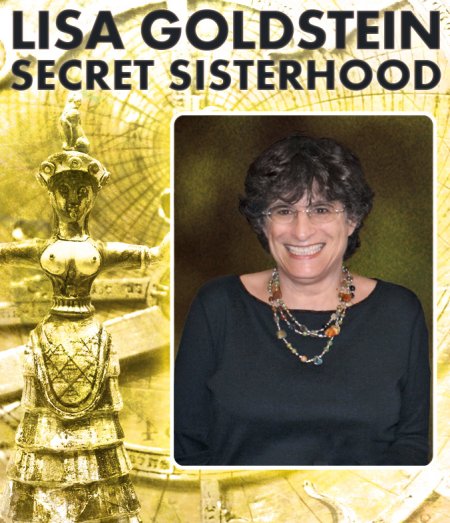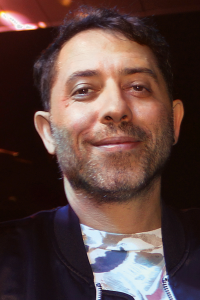Lisa Goldstein: Secret Sisterhood

Lisa Goldstein was born November 21, 1953 in Los Angeles CA. She attended UCLA, graduating with a BA in 1975, then relocated to the Bay Area, where she was a co-owner of bookstore Dark Carnival from 1976-82. Her debut novel The Red Magician (1982) won the American Book Award. Other novels include World Fantasy Award nominee The Dream Years (1985), Clarke Award finalist A Mask for the General (1987), Tourists (1989), Strange Devices of the Sun and Moon (1993), Summer King, Winter Fool (1994), Walking the Labyrinth (1996), Mythopoeic Award nominee Dark Cities Underground (1999), The Alchemist’s Door (2002), and Mythopoeic Award winner The Uncertain Places (2011). As Isabel Glass she wrote fantasy duology Daughter of Exile (2004) and The Divided Crown (2005). Her latest book is time travel novel Weighing Shadows (2015).
Goldstein’s short fiction includes Hugo and Nebula Award finalist ‘‘Cassandra’s Photographs’’ (1987); World Fantasy and Nebula Award nominees ‘‘Alfred’’ (1992) and ‘‘Fortune and Misfortune’’ (1997); Nebula Award finalists ‘‘The Narcissus Plague’’ (1994) and ‘‘Dark Rooms’’ (2007); and Sidewise Award winner ‘‘Paradise Is a Walled Garden’’ (2011). Some of her short work has been collected in Daily Voices (1989) and World Fantasy Award nominee Travellers in Magic (1994).
Goldstein married Douglas Asherman in 1986, and they live in Oakland CA.
Excerpts from the interview:
‘‘I mostly think of myself as writing fantasy, but I had this idea for a science fiction novel. I wanted to see if I could do it, so I wrote Weighing Shadows. It sounded like fun. I like that science fiction idea where you come up with a hypothesis and you see where it takes you. There’s a change in technology and you see how far you can go with that. What would happen if a group of people got ahold of time travel? How much would they be altruistic about it, and how much would they work to get power for themselves? I just like the idea of time travel. I’d want to travel in time! If somebody said, ‘Here, we’ll send you back in time,’ I’d say, ‘Sure.’ I think it’d be fun.”
…
‘‘I’ve always wondered that. If women work, who takes care of the kids? Is it shared? What exactly goes on here? In this particular matriarchy I decided there wouldn’t be the institution of marriage. Women would have kids with whoever. So who took care of the kids? She didn’t have a husband. I’ve been thinking about this idea for a long time.
‘‘I like the idea of a sisterhood working in the shadows that influences things, so I came up with the idea of a secret society that one of the time travelers starts in ancient Crete. I wanted to think that there’s some force working against all the obvious forces in history, all the wars and oppression. And I liked that it survived against all the odds, that it’s lasted for thousands of years. And that maybe you could run into them if you knew the secret meeting places and the right passwords.
‘‘I do write a lot of historical fantasy, so that part was easier. Not easy. I like reading history, and imagining myself in different eras of history. The science fiction part was interesting. It was more plot-dependent. There was a real plot, and I had to follow that plot very rigorously, because otherwise the time travel wouldn’t work. It was different than the fantasy I’d written. I had to really pay attention, to hit all the plot points. Characterization wasn’t as important as it has been in the fantasies, to me, except for the main character. I worked with the characters, I tried making them interesting characters, but it wasn’t as important. It was like, if the plot worked, the story would work out no matter what, because that was what mattered most in this book.”
…
‘‘There is a feminist streak in Weighing Shadows. Feminism has been a big deal for me for a long time, but I don’t really come out and say it. Feminism is under attack so much these days, with the war on Planned Parenthood and things, so I thought maybe I shouldn’t be so subtle about it anymore. Maybe I should say something. I don’t want to be one of those people who goes out and says, ‘Here’s my message. This isn’t really a book, it’s a manifesto.’ I hope I told a good story in addition to saying something about feminism. I really got fascinated by ancient Crete because it was a matriarchy. I wanted to point that out. Their society worked. It lasted for a thousand years, and it had stability. We can’t decipher their writing, at least not well, and we know so little. But there are these beautiful, beautiful frescoes and artwork. They had this thriving art, but there’s so little known about them, and people have strange ideas because there’s so little known about their society.”
…
‘‘Charles Brown said that really good-selling writers are paranoid. They see connections everywhere. I do try to do that. In this book I started connecting all the words that start with ‘cor’ or ‘car.’ There are all these place names that start with those, like Carcassonne and Corinth. The names might go back to the goddess Kore, but that’s another thing nobody knows for sure, so I got to decide and say, ‘Yes they do.’ I got to come up with an entire conspiracy just based on this one fact.
‘‘The Daughter of Exile books came out under a pseudonym, Isabel Glass. The thinking was, the high fantasy was different from my usual stuff, so it should go out under a pseudonym. What happened in practice was, I didn’t get to promote the books, because they weren’t supposed to be by me. So they didn’t get promoted at all. They didn’t do terribly well, and I think now they would have done better under my own name. Nobody knows. But looking back, I think it was a bad decision.
‘‘Writing in that high fantasy style was fun, too. I’d like to do that again. I got the rights back, and I put the e-books out under my own name, so that’s working. I think that’s proof of my theory, anyway, that the books would have done better under my name. That’s one great thing about e-books, that books can have another chance even if they didn’t do that well the first time around, that they can still discover their readers. I can see where some people would want a pseudonym, if they start writing something really different, like mysteries instead of SF or something, but for me it just didn’t work.”
Read the complete interview in the March 2016 issue of Locus Magazine. Interview design by Francesca Myman.






